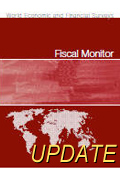On January 27, 2011, the IMF released an update to its flagship publication on fiscal issues: The Fiscal Monitor. We are posting here the beginning of the text of this update titled "Strengthening Fiscal Credibility". We provide at the end of this post, a pdf copy of the full text (and corresponding data tables), as well as a link to the relevant IMF web page.
Despite the improving global outlook, the pace of fiscal consolidation this year is slowing in some key countries. The United States and Japan are adopting new stimulus measures and delaying consolidation relative to the pace envisaged in the November 2010 Fiscal Monitor. The underlying fiscal outlook has also weakened in some emerging markets—among them are several that need to build larger fiscal buffers, particularly in the face of surging capital inflows, overheating, and possible contagion from advanced countries. By contrast, advanced economies in Europe are projected to continue tightening policies amid heightened market scrutiny in several countries. Altogether, sovereign risks remain elevated and in some cases have increased since November, underlining the need for more robust and specific medium-term consolidation plans.
Fiscal outturns in 2010 were slightly better than projected, but some large emerging economies underperformed
While advanced economies maintained expansionary fiscal policies on average in 2010, outturns were generally slightly better than projected in the November 2010 Fiscal Monitor. Revenue collection exceeded expectations across most major economies—both output growth and, in some countries, the responsiveness of revenues to output were larger than expected—and spending was lower (Table 1). Overall, the average deficit of advanced economies fell compared with 2009 by about 1 percentage point, to about 8 percent of GDP (0.3 percent better than projected). Excluding the impact of growth and financial sector support, the cyclically adjusted balance widened slightly. Deficits in Germany and the United States were lower than in the November Monitor, reflecting good revenue performance and lower spending—due in Germany to the strong labor market and in the United States to some legislative delays in approving spending and lower financial sector support. Euro-area countries that had targeted large fiscal consolidations generally succeeded in posting marked deficit reductions. Meanwhile, advanced economy gross general government debt continued to rise rapidly in 2010, topping 96 percent of GDP.
Overall emerging economy fiscal deficits were broadly in line with November forecasts, but there were some significant deviations at the country level. Their average headline deficit in 2010 is projected at about 4 percent of GDP, ¾ percentage point lower than in 2009, leaving the average gross general government debt broadly stable at about 37 percent of GDP. The average cyclically adjusted deficit in 2010 was almost unchanged from the previous year. As in advanced economies, revenue collection exceeded expectations, reflecting mainly stronger growth and higher commodity prices, and in some cases sizable one-off receipts (notably the sale of oil concessions in Brazil and auction of telecommunication licenses in India). Higher revenues, however, were generally used to finance higher spending. In part reflecting this, fiscal balances in several key economies (most notably Brazil, China, and India) turned out weaker than projected in the November Monitor (Table 1). Offsetting this, a few countries are expected to realize lower headline and cyclically adjusted deficits than earlier projected, due primarily to higher commodity prices (Russia, Saudi Arabia) and delays in implementing capital expenditure projects (Turkey).
[...] Click on the following link to access the rest of the text of the Fiscal Monitor Update or download the full pdf file here: Download Fmindex[1].








